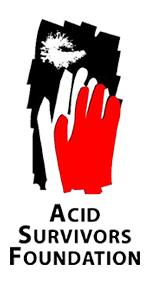| The work of ASF has been recognized by the international bodies like Buckingham Palace, Amnesty International, World Health Organisation (WHO), Americans for UNFPA (the United Nations Population Fund), UN Human Rights Council and the World’s Children’s Prize Foundation which is considered as children’s Nobel Prize. | |||||||||
|
|||||||||
| Seeing the success of Bangladesh many country like Pakistan, India, Nepal, Cambodia and Uganda have also taken similar initiatives to combat acid violence. ASF runs a 20-bed licensed hospital specialized for acid and burn violence victims, which is fully equipped for standard burn care services including plastic and reconstructive surgery, though in a very low-resourced set up. Since an overwhelming majority of the victims are impoverished, the ASF Hospital offers completely free services benefitting around 700 acid victims annually (including survivors from previous years). | |||||||||
| ASF has provided treatment, education and rehabilitation opportunities to a large number of survivors. Many victims are now professionally active in ASF itself and beyond. Survivors are represented in the governing body of ASF. They are now in leading positions in ASF management and program implementation. ASF has also transformed many ‘survivors’ into ‘survivor ambassadors’ who function as a platform for a collective voice to demand justice, protect rights, and act as an agent for prevention and integration into family and the society. Victim of an acid attack living in remote rural places now have access to psychosocial support from these ‘survivor ambassadors’.ASF’s rights-based campaign has led to many unprecedented institutional and policy reforms. Thanks to ASF’s persistent efforts, Bangladesh is the only country to have enacted two laws in 2002—one that heightens criminal penalties and improves criminal procedures and another that controls the availability of acid. In order to implement these laws effectively, ASF works with the National Acid Control Council of the Government, the highest level inter ministerial body and its district committees. The National Acid Control Council and the Social Welfare Ministry have created a special fund to compensate the medical, legal and rehabilitation costs. However, survivors’ access to these resources is still insignificant. As such ASF’s role to advocate meeting the needs of each survivor remains as continuous process.
ASF’s multi-dimensional and multi-stakeholder prevention campaign has contributed to significant reduction of the number of acid attacks over the years. Before the ASF prevention campaign started in 2002, there were over 500 recorded attacks. In 2010 the number decreased to around 153, which nevertheless remains a grave concern with one attack in every two and half days. The challenge is to sustain the downward trend and eliminate this violence of unspeakable nature. Success Stories Membership ( NACC/ Monitoring cell / Victim Support Center ,Men & Boys Network, Girl Child Forum , Interburns) |
24-hour Hotline: 01713010461



